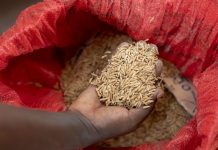
AfricaPress-Tanzania: THE Japanese government has contributed US$1.5 million ( about 3.4 bn/-) to the United Nations World Food Programme (WFP) to support the implementation of the four-year Boresha Lishe nutrition project in rural areas of central Tanzania.
Launched Tanzania in 2017, the project aims to improve nutrition for 30,000 women and children through social behaviour change communication, diversification of food production and distribution of specialised nutritious foods in Bahi and Chamwino districts in Dodoma Region and Ikungi and Singida rural districts in Singida Region.
“In Tanzania, the Government of Japan has been providing assistance in various sectors,” said Shinichi Goto, Ambassador of Japan to Tanzania. “This particular contribution is directed toward women and children in rural areas, supporting ‘Leaving no one behind’ of the 2030 agenda based on the important concept of human security. It will improve nutrition and income generation of the vulnerable groups,” he added.
The Boresha Lishe project works to improve knowledge on nutrition, dietary diversity and water, sanitation and hygiene practices (WASH).
In addition, keeping small-scale livestock, planting diverse crops and mobilising VICOBA are promoted, increasing access to capital as well as nutritious foods.
In collaboration with Japan, WFP is supplying and installing solar power kiosks to 40 village community banking groups (VICOBAs) supported under the Boresha Lishe project.
The kiosks contain rechargeable rental devices such as lanterns and are operated as a business, providing income opportunities for the VICOBA and community members.
“Through the Boresha Lishe project, WFP is adopting a multi-sectoral approach, combining the provision of specialised nutritious foods, behavioural change communication, while enabling communities to access income generating activities,” said Michael Dunford, WFP Representative in Tanzania.
“With the support from the Government of Japan, WFP is improving women and children’s nutrition and the future of these communities.”
For the supply and installation of solar power kiosks, WFP is working with a Japanese private company, leveraging its expertise accumulated through their business operations over the years.
The Boresha Lishe project is co-funded by Japan, the European Union and WFP. Recently, WFP launched International Passenger Air Service for Humanitarian and Hearth Workers to combat Covid-19, started Africa flights for humanitarian workers in Covid-19 response in Tanzania.
“The window of opportunity to surge medical and humanitarian equipment into Africa to curb the pandemic is closing fast,” said Amer Daoudi, WFP’s Covid-19 Response Director.
“Our global logistics support system is up-and-running, and this delivery marks the first of many cargo shipments we will fly to all corners of the globe,” he added.
WFP expects to transport the equivalent of 37 Boeing 747 planeloads over the next six weeks from China and Malaysia to 130 countries around the world. Once the service is fully up and running, as many as 350 cargo and another 350 passenger flights could fly every month.
WFP was established in 1961 after the 1960 Food and Agriculture Organisation (FAO) Conference, when George McGovern, director of the US Food for Peace Programmes, proposed establishing a multilateral food aid programme.
The WFP was formally established in 1963 by the FAO and the United Nations General Assembly on a three-year experimental basis. In 1965, the programme was extended to a continuing basis.
WFP is leading the logistics pillar to support the Ministry of Health-led response.
WFP was requested to coordinate the logistics response of development partners and agencies by identifying logistical needs, bottlenecks and gaps of the international community in the response to the Covid-19 pandemic.
The United Nations World Food Programme saves lives in emergencies and changes lives for millions through sustainable development.
WFP works in more than 80 countries around the world, feeding people caught in conflict and disasters, and laying the foundations for a better future.






